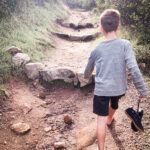3 Things I Had To UNLEARN As a New Homeschool Mom
As a new homeschool mom over 7 years ago, I knew that I had a lot to learn. But I never could have imagined that first I would have to unlearn so many things. Having spent my entire education in the public and private school systems I was used to only one way of learning: being fed information through a qualified adult, memorizing and regurgitating, being tested and graded, then moving on to the next subject.
Naturally it made sense to me that our home education would look similar. Afterall, there was 13 years worth of information I was fed that I would now have to figure out how to feed to my own children. Realizing I had a lot to unlearn was a sobering thought, but its necessity brought about true freedom in our homeschool and family life.
Here are three ingrained thoughts that I had to unlearn as a homeschool mom.
Having (the right) Curriculum is Essential

I used to think that I needed the right curriculum, or at least A curriculum. But as it turns out, the information itself is actually far less important than the relationships and charter building happening at home. Curriculum can be a fantastic tool to help families learn and explore, but they are not completely necessary to homeschool.
Learning isn’t something that only happens under the instruction of an adult or book guide. Rather the most important information and skills a child learns comes from real life experiences that lead to character development. Think coping mechanisms, impulse control, emotional stability, teamwork, empathy, work ethic, etc. Prioritizing these over what comes in a curriculum will lead to children and adults who are better equipped for the real world.
I Need To Have All The Answers Before We Start
If we all still thought and felt like this, I don’t think there would be many homeschool parents left in the world. Here’s the deal: you are the best person to guide your children because you care for them more than anyone else. Notice I said guide, not teach. The truth is that you do not know everything. Sorry if that stings. Your children might want to learn subjects you’ve never studied or simply don’t remember. But as a guide to your children’s education, you can help them learn how to learn these things, and also learn them yourself alongside your children.
Even better, when we as parents get to honestly say to our children, “I don’t know the answer to that” and then demonstrate how to find the answer, we are teaching humility, honesty, and perseverance. We are showing them that they don’t always have to know the answer, it’s good to be curious, and that there are plenty of ways to find what they want to know.



Play Is Just Taking a Break From Learning
Did you know that play actually is learning? Especially when children can enjoy free-play in mixed age groups (meaning, non structured play where an adult isn’t directing). And this doesn’t just go for young children, this is true of teens, and even adults, too.
“Playing with other children, away from adults, is how children learn to make their own decisions, control their emotions and impulses, see from others’ perspectives, negotiate differences with others, and make friends. In short, play is how children learn to take control of their lives.”
Peter Gray, Free to learn
In play, children get to mimic adults, take risks, learn to recover from their mistakes, and generally find their groove. Play is where we explore and pursue our interests and expand our creativity. Leaving lots and lots of room for play in our children’s lives is of utmost importance because this is where they’ll really thrive and set themselves up to be successful adults.
Related Posts


